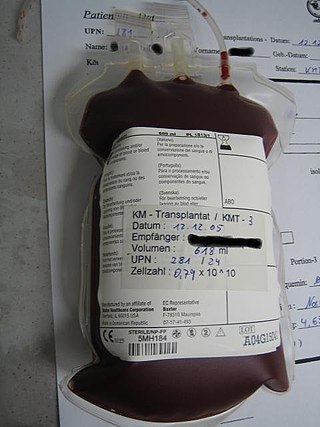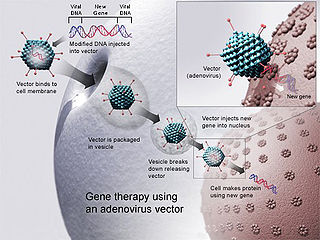External links
- Official Site
- Researchers from Israel, Southern California to Present Stem Cell Symposium
- Researchers team up to tackle cystic fibrosis
European Society of Gene & Cell Therapy (ESGCT) formerly European Society of Gene Therapy (ESGT) is a legally registered professional body which emerged from a small working group in 1992 that focused on human gene therapy.
The objectives of the ESGT include the following:
The official journal of the ESGT is The Journal of Gene Medicine .
The ESGT works with other entities in the scientific communities in the event that an adverse effect to a specific gene therapy is discovered. Investigations the ESGT has been involved with include the adverse effects discovered during the French X-SCID gene therapy trial. The ESGT hosted a forum of 500 researchers from various facilities around the world, including representatives from the Stanford University and the Sloan Kettering Cancer Research Center.

A genetically modified organism (GMO) is any organism whose genetic material has been altered using genetic engineering techniques. The exact definition of a genetically modified organism and what constitutes genetic engineering varies, with the most common being an organism altered in a way that "does not occur naturally by mating and/or natural recombination". A wide variety of organisms have been genetically modified (GM), including animals, plants, and microorganisms.

Genetic engineering, also called genetic modification or genetic manipulation, is the modification and manipulation of an organism's genes using technology. It is a set of technologies used to change the genetic makeup of cells, including the transfer of genes within and across species boundaries to produce improved or novel organisms.

Gene therapy is a medical technology that aims to produce a therapeutic effect through the manipulation of gene expression or through altering the biological properties of living cells.
Bioethics is both a field of study and professional practice, interested in ethical issues related to health, including those emerging from advances in biology, medicine, and technologies. It proposes the discussion about moral discernment in society and it is often related to medical policy and practice, but also to broader questions as environment, well-being and public health. Bioethics is concerned with the ethical questions that arise in the relationships among life sciences, biotechnology, medicine, politics, law, theology and philosophy. It includes the study of values relating to primary care, other branches of medicine, ethical education in science, animal, and environmental ethics, and public health.

Hematopoietic stem-cell transplantation (HSCT) is the transplantation of multipotent hematopoietic stem cells, usually derived from bone marrow, peripheral blood, or umbilical cord blood, in order to replicate inside a patient and produce additional normal blood cells. HSCT may be autologous, syngeneic, or allogeneic.

Human genetic enhancement or human genetic engineering refers to human enhancement by means of a genetic modification. This could be done in order to cure diseases, prevent the possibility of getting a particular disease, to improve athlete performance in sporting events, or to change physical appearance, metabolism, and even improve physical capabilities and mental faculties such as memory and intelligence. These genetic enhancements may or may not be done in such a way that the change is heritable.
Clinical pharmacology is "that discipline that teaches, does research, frames policy, gives information and advice about the actions and proper uses of medicines in humans and implements that knowledge in clinical practice". Clinical pharmacology is inherently a translational discipline underpinned by the basic science of pharmacology, engaged in the experimental and observational study of the disposition and effects of drugs in humans, and committed to the translation of science into evidence-based therapeutics. It has a broad scope, from the discovery of new target molecules to the effects of drug usage in whole populations. The main aim of clinical pharmacology is to generate data for optimum use of drugs and the practice of 'evidence-based medicine'.

Krabbe disease (KD) is a rare and often fatal lysosomal storage disease that results in progressive damage to the nervous system. KD involves dysfunctional metabolism of sphingolipids and is inherited in an autosomal recessive pattern. The disease is named after the Danish neurologist Knud Krabbe (1885–1961).
Metachromatic leukodystrophy (MLD) is a lysosomal storage disease which is commonly listed in the family of leukodystrophies as well as among the sphingolipidoses as it affects the metabolism of sphingolipids. Leukodystrophies affect the growth and/or development of myelin, the fatty covering which acts as an insulator around nerve fibers throughout the central and peripheral nervous systems. MLD involves cerebroside sulfate accumulation. Metachromatic leukodystrophy, like most enzyme deficiencies, has an autosomal recessive inheritance pattern.
A biopharmaceutical, also known as a biological medical product, or biologic, is any pharmaceutical drug product manufactured in, extracted from, or semisynthesized from biological sources. Different from totally synthesized pharmaceuticals, they include vaccines, whole blood, blood components, allergenics, somatic cells, gene therapies, tissues, recombinant therapeutic protein, and living medicines used in cell therapy. Biologics can be composed of sugars, proteins, nucleic acids, or complex combinations of these substances, or may be living cells or tissues. They are isolated from living sources—human, animal, plant, fungal, or microbial. They can be used in both human and animal medicine.
American Society of Gene & Cell Therapy (ASGCT) is a professional non-profit medical and scientific organization based in Milwaukee, dedicated to understanding, development and application of gene, related cell and nucleic acid therapies, as well as promotion of professional and public education on gene therapy. With more than 4,800 members in the United States and worldwide, today ASGCT is the largest association of individuals involved in gene and cell therapy research.
Pharmacotherapy, also known as pharmacological therapy or drug therapy, is defined as medical treatment that utilizes one or more pharmaceutical drugs to improve ongoing symptoms, treat the underlying condition, or act as a prevention for other diseases (prophylaxis).
Primary immunodeficiencies are disorders in which part of the body's immune system is missing or does not function normally. To be considered a primary immunodeficiency (PID), the immune deficiency must be inborn, not caused by secondary factors such as other disease, drug treatment, or environmental exposure to toxins. Most primary immunodeficiencies are genetic disorders; the majority are diagnosed in children under the age of one, although milder forms may not be recognized until adulthood. While there are over 430 recognized inborn errors of immunity (IEIs) as of 2019, the vast majority of which are PIDs, most are very rare. About 1 in 500 people in the United States are born with a primary immunodeficiency. Immune deficiencies can result in persistent or recurring infections, auto-inflammatory disorders, tumors, and disorders of various organs. There are currently limited treatments available for these conditions; most are specific to a particular type of PID. Research is currently evaluating the use of stem cell transplants (HSCT) and experimental gene therapies as avenues for treatment in limited subsets of PIDs.
Public health genomics is the use of genomics information to benefit public health. This is visualized as more effective preventive care and disease treatments with better specificity, tailored to the genetic makeup of each patient. According to the Centers for Disease Control and Prevention (U.S.), Public Health genomics is an emerging field of study that assesses the impact of genes and their interaction with behavior, diet and the environment on the population's health.
Immunogenetics or immungenetics is the branch of Medical Immunology and Medical Genetics that explores the relationship between the immune system and genetics.

Sickle cell disease (SCD), also simply called sickle cell, is a group of hemoglobin-related blood disorders typically inherited. The most common type is known as sickle cell anemia. It results in an abnormality in the oxygen-carrying protein haemoglobin found in red blood cells. This leads to a rigid, sickle-like shape under certain circumstances. Problems in sickle cell disease typically begin around 5 to 6 months of age. A number of health problems may develop, such as attacks of pain in joints, anemia, swelling in the hands and feet, bacterial infections, dizziness and stroke. Long-term pain may develop as people get older. The average life expectancy in the developed world is 40 to 60 years. It often gets worse with age. All the major organs are affected by sickle cell disease. The liver, heart, kidneys, gallbladder, eyes, bones, and joints also can suffer damage from the abnormal functions of the sickle cells, and their inability to flow through the small blood vessels correctly.

Masayoshi Yamaguchi is a biomedical scientist and researcher, most known for his contributions to biomedical fields including biochemistry, endocrinology, metabolism, nutrition, pharmacology, and toxicology. He is a full professor in the Cancer Biology Program at the University of Hawaii Cancer Center, University of Hawaii at Manoa (UH), focusing on research in bone and calcium endocrinology, metabolism, cell calcium signaling, gene regulation, dietary prevention of osteoporosis, carcinogenesis, and cancer therapy.
Molecular oncology is an interdisciplinary medical specialty at the interface of medicinal chemistry and oncology that refers to the investigation of the chemistry of cancer and tumors at the molecular scale. Also the development and application of molecularly targeted therapies.
A small proportion of humans show partial or apparently complete innate resistance to HIV, the virus that causes AIDS. The main mechanism is a mutation of the gene encoding CCR5, which acts as a co-receptor for HIV. It is estimated that the proportion of people with some form of resistance to HIV is under 10%.

Acalabrutinib, sold under the brand name Calquence, is a medication used to treat various types of non-Hodgkin lymphoma, including mantle cell lymphoma (MCL) and chronic lymphocytic leukemia/small lymphocytic Lymphoma (CLL/SLL). It may be used both in relapsed as well as in treatment-naive settings.